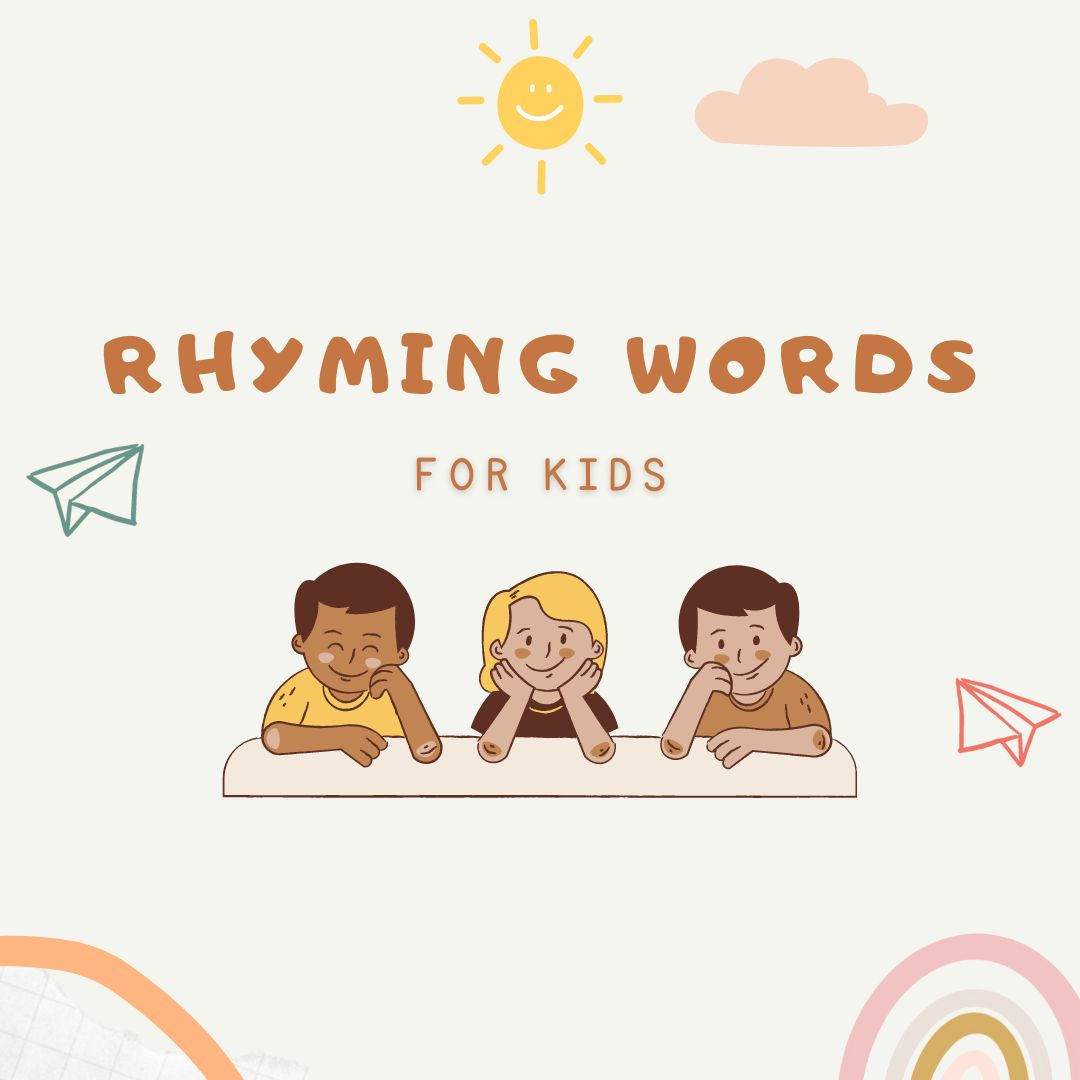Definition of Rhyming Words:-
Do you remember when you first learned the alphabet A-Z? The teacher taught them in a rhyme, which still sticks in our minds. Whatever we know in a rhyming format sticks within our minds for a long time. Children learn rhyming words in three stages: exposure, recognition, and production.
The first stage, i.e., ‘exposure,’ involves listening to rhyming songs to bring familiarity about the activity and upcoming words. The next stage is ‘recognition,’ wherein children remember the sequence of the rhyming words.
The last stage is ‘production,’ wherein the child sings the song in the correct format in front of an audience. In short, words with the same ending or sound similar while speaking are commonly referred to as rhyming words. For example, the next stage is to avoid wastage.
List of Rhyming Words in English:-
Rhyme with ‘at’
- Bat
- Cat
- Fat
- Hat
- Chat
- Mat
- Pat
- Rat
- Sat
Rhyme with ‘ap’
- Cap
- Gap
- Lap
- Map
- Snap
- Clap
- Nap
- Rap
- Sap
- Tap
- Yap
- Zap
Rhyme with ‘en’
- Den
- Hen
- Men
- Bent
- Tent
- Pen
- Ten
- Zen
Rhyme with ‘et’
- Bet
- Get
- Jet
- Let
- Met
- Yet
- Net
- Pet
- Set
- Vet
- Wet
Rhyme with ‘in’
- Bin
- Din
- Fin
- Kin
- Inn
- Chin
- Shin
- Skin
- Spin
- Thin
- Twin
- Pin
- Sin
- Tin
- Win
3 Letter Rhyming Words in English
| Cot | Bow | Bog | Cod |
| Tot | Wow | Log | Bod |
| Lot | Now | Hog | Rod |
| Rot | Cow | Cog | Odd |
| Jot | Pow | Dog | Pod |
| Pot | Vow | Jog | Nod |
| Hot | How | Fog | God |
| Not | Mow | Sog | Mod |
4 Letter Rhyming Words in English
| Ball | Blab | Chip | Crop |
| Call | Stab | Whip | Stop |
| Fall | Grab | Skip | Prop |
| Mall | Slab | Grip | Flop |
| Hall | Drab | Snip | Shop |
| Wall | Flab | Slip | Clop |
| Tall | Crab | Trip | Plop |
| Pall | Scab | Drip | Drop |
Benefits of Learning Rhyming Words for Kids:-
Rhyming helps repeat words that otherwise would have been difficult to learn or remember. Moreover, it piques the learners’ interest, in this case, the kids to understand more about the word so that they can explain it to whoever asks about it.
Furthermore, rhyming helps in polishing the spoken English skills of children and helps to avoid fumbling, lisps, or similar verbal English problems. Rhyming is an excellent activity as children often become interested in it and start thinking about similar words or asking for suggestions, which enhances their vocabulary.
Additionally, while practicing rhymes, children often enhance their sound vocabulary of different words. It also enables children to pronounce new words ideally by relating to the rhyming words’ pronunciations.
Several studies have shown that rhyming words enhance phonemic awareness in listeners. Therefore, rhyming is more than entertaining; it helps to educate the listeners. Besides this, rhymes develop a child’s interest in learning English and speaking fluently. One of the most significant benefits of practicing rhyming words is that it enables one to remember the poem, story, and characters.
For example, children in their 10th class often have poems and paragraphs that they must remember and recall to correctly answer questions in class and during the board exams. Rhyming is one of the ways that helps to remove the stress of remembering the content and engages the reader in the author’s world. The student no longer feels burdened by long-form poems, paragraphs, and characters, as the rhymes help them remember them.
Nowadays, rhymes have been frequently used in movies and songs to make them appear exciting and memorable. For example, children can remember Salman Khan’s song Dhinka Chika from the movie Ready mentions seasons of all twelve months in India. The same is true in commercials or ads. The advertisers often write rhymes so that people remember the brand for a long time. Children find such rhyming commercials fascinating.
